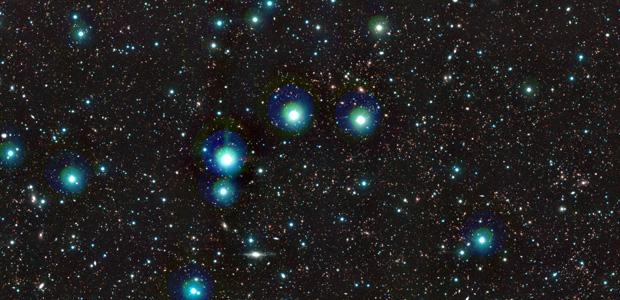Deep space photos offer a panoramic view of the universe
In this color composite of the UltraVISTA image, the large white objects are foreground stars in our own Milk Way Galaxy. The most distant galaxies appear as faint red dots. (Photo courtesy of UltraVista/Terapix/CNRS/CASU.)
The image of deep space released earlier this week looks unremarkable to the untrained eye. But according to James Dunlop, the image offers an unprecedented view of the universe.
“Light takes a finite amount of time to travel towards us, so when you look farther away, you actually see farther back in time,” said Dunlop, an astronomer from the University of Edinburgh. “The faintest galaxy you can see here, you’re actually looking back in time about 12-13 billion years. Which is about 90% of the age of the universe.”
To capture the remarkable image, the European Southern Observatory’s VISTA telescope trained its lenses on a singular patch of sky, and over hours of exposure was able to gather in the faint light of distant galaxies. More than 6,000 separate exposures were pieced together to create the image.
“What we’re seeing here are some of the first galaxies that ever formed in the universe, less than a billion years after the big bang,” Dunlop said. “So we’re seeing galaxies in their youth. A kind of wild and unruly youth because they’re very active forming stars.”
Dunlop is planning to continue the work by collecting more images of the same patch of sky, but there is a limit to how far back in time humans are able to see.
“There is a picture of the universe from even earlier … taken when it was only about 200,000 years old,” Dunlop said. “And we know from that image that the universe was very hot and full of gas at that time before any galaxies or stars had formed. A time beyond that you can’t actually see because that’s like coming into a bank of fog.”
Dunlop believes that probing deep space will help humans understand where we come from.
“This shows us part of our history,” Dunlop said. “We have all been made, all the elements in our bodies were made in stars a long time ago and in galaxies like the ones you see in this image. So this may seem far fetched and far flung, but in some ways its personal, its our beginning you’re looking at here.”
